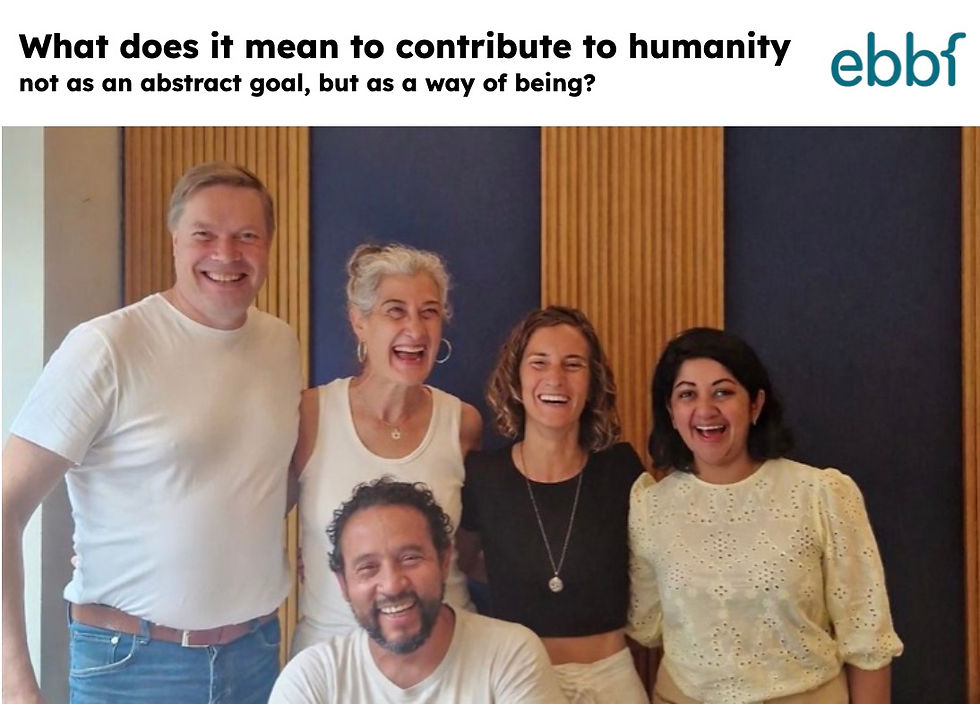#ebbf25 – Gary Reusche brings his own set of questions about prosperity to the event in Barcel
- sjoerdluteyn
- Sep 14, 2015
- 3 min read

Gary Reusche
Gary Reusche just about to end a long term career at the World Bank is also one of the original members of ebbf and just to give you an idea of the diversity of participants and of conversations that will enrich the next ebbf international event, he now comes to Barcelona with his own set of questions keen to explore the motivations that will bring about an interconnectedness of prosperity during the event, starting by learning about his own country of residence: Ukraine.
He writes “Ukraine is part of Russia, right? It wasn’t too long ago that most of the world saw Ukraine as part of Russia. In the last couple of years, the world has come to know that Ukrainians want to re-establish their own identity. Geopolitical politics, tanks, rockets, bullets, grenades, students killed by snipers, rural homes destroyed by duelling artilleries, deaths, millions displaced, conflicting stories about who is doing what and why— part of every day life now in Ukraine (and Europe).
The theme of the conference is prosperity. But … is prosperity possible in one part of the world, when other parts of the world experience the horrors of war or the injustice of powerful oligarchs of whatever persuasion? The Baha’i International Community stated that there is an “interconnected nature of our challenges and our prosperity.” More specifically, “The increasingly apparent interconnectedness of development, security and human rights on a global scale confirms that peace and prosperity are indivisible – that no sustainable benefit can be conferred on a nation or community if the welfare of the nations as a whole is ignored or neglected.”
What happened in Ukraine? Did we witness a peaceful uprising against a corrupt administration, started by students wanting to live without corruption, small businesses protesting against so-called “rent seekers”?
The interconnectedness of prosperity is not on the agenda anywhere. Refugees are flooding into Europe from the Middle East, and Africa. But why are they fleeing? What factors created this flood of human misery? Can we ignore the conditions that created this catastrophe and still talk about prosperity in Europe only? I don’t think so.
When business discusses prosperity, exactly what prosperity is being discussed? Is it the prosperity of the owners, or the CEOs, or the employees, or their families? These are all different perspectives. What time frame is being discussed for prosperity? How long is any prosperity going to last in a world increasingly threatened almost daily by every conceivable catastrophe.
Maybe there are lessons from Ukraine. In Ukraine nobody believes the government is going to lead the cultural change required to create a more inclusive, interconnected prosperity. We are seeing the same from the US. More people are needed to turn the tide.
So how to make a difference? Interesting question that I hope the conference will discuss. In American politics Bernie Sanders is saying, even if elected, he (or any other potential leader) would be powerless to make the necessary changes. His upshot is that more people must be passionate about the interconnectedness of prosperity to make a difference.
How can ebbf and business play an effective role to ensure that prosperity is understood as something different from the acquisition of material goods for small minorities in limited corners of the world? What role can business play to catalyse people to arise and work for inclusiveness and unity and sustainable prosperity?







Comments